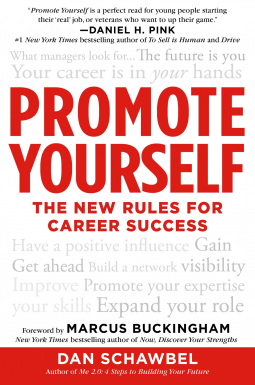As college students, a huge worry is finding a job after college. It is no longer the case that simply having a college education will open doors. In Dan Schawbel’s bestselling book Promote Yourself: The New Rules For Career Success, Schawbel attempts to help give readers that extra competitive edge.
Dan Schawbel is an extremely competent source who often speaks from his own highly successful experience. He now writes as a columnist for both the New York Times and Forbes. He is also the managing partner of Millennial Branding.
The book references many surveys and has a good deal of empirical evidence to back up its claims. The front cover advertises that it is “A perfect read for young people starting their ‘real’ job.” Schawbel later says that, “This book is written for all you high-potential young workers…. who have no clear career roadmap.” I think that this book can also be extremely useful to college students, even before graduation.
It gives tips to help build up a “person’s brand.” Schawbel advises readers to put oneself in a position where he or she is indispensable. He believes that a person should have a unique skill that allows him or her to stand out among their peers. He also advises readers to develop both hard skills (such as computer skills) and soft skills (such as empathy or leadership). While Schawbel asserts that both skills are essential, he also proposes that soft skills are more important than hard skills. As he puts it, hard skills are “a dime a dozen” and easily learned. Yet, with this said, he in no way diminishes the importance of acquiring hard skills that allow one to excel in his or her chosen profession. Although Schawbel believes that soft skills are harder to learn, he gives advice on how to learn these skills.
Schawbel’s most unique advice comes when he suggests to the readers to dispense with the common myth to develop one’s weaknesses so that he or she is a well-rounded employer. Instead, Schawbel suggests that it is crucial to develop strengths. (A helpful way to do this, especially if one is not sure what his or her strengths are, is to look into StrengthQuest).
One of the final points that Schawbel makes is something that it seems has been preached to students constantly since high school: be careful with social media. He offers the usual warnings about postings and pictures. He also advises readers to be careful even after one attains a job. Schawbel warns that an employee of a company is a representation of that company’s brand. He also reminds the reader that oftentimes, an employee will be in contact socially with coworkers on sites such as Twitter and Facebook, and therefore anything negative said about the company can get back to bosses.
Yet Schawbel does not stop with just the usual warning, he also advises how to use the Internet for positive self-advertising. He suggests sights that can help people get in contact with good connections. He highlights that the most important factor in attaining a job is who a person knows. Schawbel recites the old adage that “it’s not what you know, it’s who you know.” He suggests carefully cultivating your image online in order to positively advertise yourself.
I would suggest this book to anyone who wants a slightly more competitive edge over his or her peers. A lot of what is said has been said before, but this book serves as a great guideline to promoting yourself. There are some points that might be repetitive, and it might seem more prudent to skim. Yet there are many clearly outlined tips (with either numbers, bullet points or bolding) that allow for easy access to information. Even if the reader only receives a few useful suggestions from this book, I believe that every little bit helps. In today’s world, the distinguishing factors between competing applicants are so slim that any little advantage can make a huge difference.








































































































